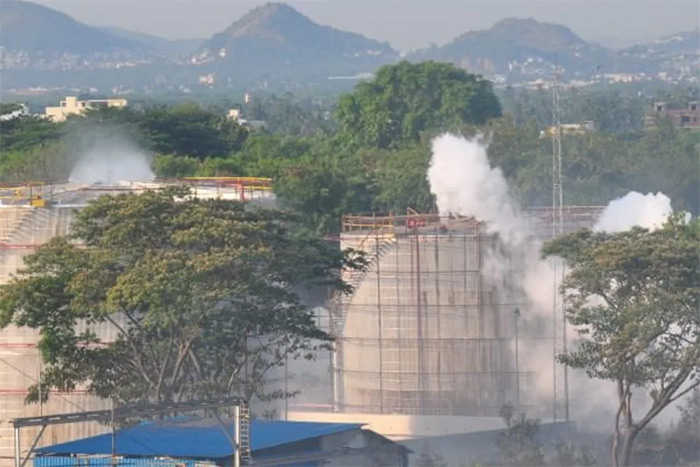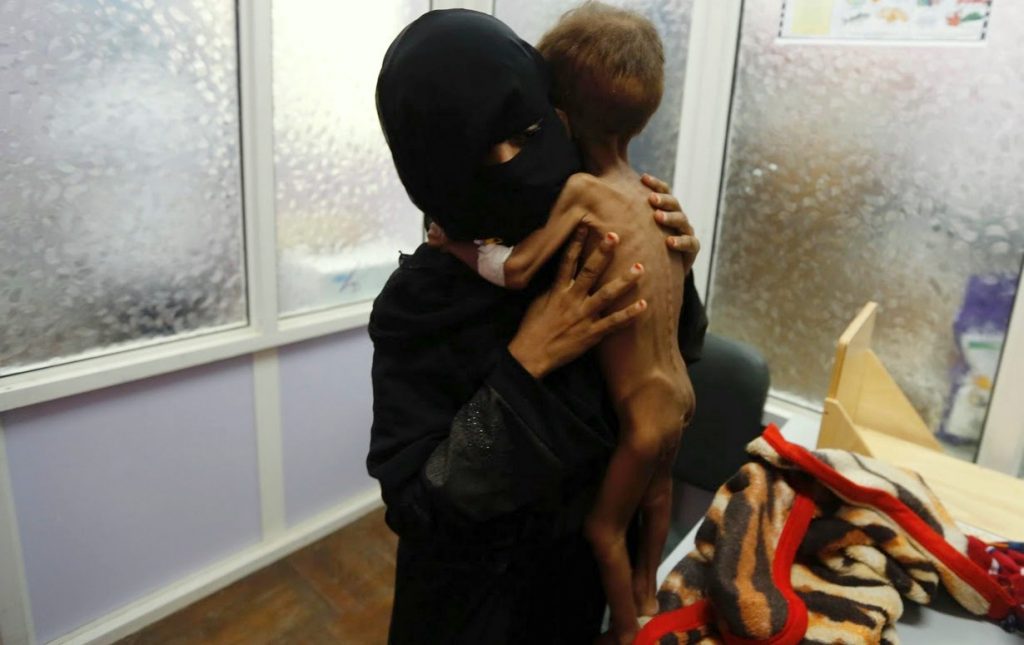It's Live on the HomePage Now:
Reader Supported News
RSN: Mort Rosenblum | The World According to Trump

Mort Rosenblum, Reader Supported News
Rosenblum writes: "My favorite front page in a hometown paper splashes big letters across the top about a mysterious prowler. A small headline below says, 'Two Dacron Women Feared Missing in Volcanic Disaster,' with a tiny subhead: 'Japan Destroyed.' An arrow on a Pacific Ocean map is labeled, 'Where Japan was formerly located.'"
The National Lampoon’s Dacron Republic-Democrat in 1978 spoofed an obsession for “the local angle.” Today, I wouldn’t be surprised at something similar, for real, on my doorstep. America has never been so closely, and dangerously, focused on itself.
Transfixed by Donald Trump’s depredations at home, few Americans reflect on the world of pain his self-focused folly causes abroad: conflicts flare, poverty deepens, terrorism thrives, human rights vanish, trade wars cripple the global economy.
He shuns cooperation, not only to contain a highly contagious new virus likely to kill millions but also to mitigate climate collapse and sea change that are pushing humanity toward a die-off of billions.
Depending on Trump’s purpose, Xi Jinping is a brilliant, transparent leader or a shameless cheat who hides evidence of a plague while robbing America blind. As a result, a wary China focuses on muscling aside America as world leader, one way or another.
Solid reporting abounds. The Washington Post won a Pulitzer for a series on how fast Earth is overheating. The New York Times’s prize package exposed Russia’s shadow wars — bombings, murder, bribes, disinformation — in Europe, the Middle East, and Africa.
Yet a survey during Covid-19 isolation showed a slight increase in news readership while gaming and old TV reruns were off the charts. With so many choices for have-it-your-way news, people shape personal worldviews around their own prejudices.
In April, Fintan O’Toole of The Irish Times stunned Americans with an unsparing account of how their country appears from the outside. He wrote:
“Over more than two centuries the United States has stirred a very wide range of feelings in the rest of the world: love and hatred, fear and hope, envy and contempt, awe and anger. But there is one emotion that has never been directed toward the US until now: pity.
“However bad things are for most other rich democracies, it is hard not to feel sorry for Americans. Most of them did not vote for Donald Trump in 2016. Yet they are locked down with a malignant narcissist who, instead of protecting his people from Covid-19, has amplified its lethality. The country Trump promised to make great again has never in its history seemed so pitiful.”
O’Toole quoted George Packer’s remark in The Atlantic: “The United States reacted ... like Pakistan or Belarus — like a country with shoddy infrastructure and a dysfunctional government whose leaders were too corrupt or stupid to head off mass suffering.”
Then he stepped back to trace how American ignorance and insularity produced a Donald Trump, who promised to end “American carnage” in his inaugural address yet now revels in all the carnage he has created.
As things get worse, he concluded, “[Trump] will pump more hatred and falsehood, more death-wish defiance of reason and decency, into the groundwater. If a new administration succeeds him … it will have to clean up the toxic dump he leaves behind. If he is re-elected, toxicity will have become the lifeblood of American politics.”
It is getting worse fast. As Trump pushes states to reopen so the economy improves before November, his own advisers’ confidential studies estimate the level of infection and likely death is three times greater than what the public is told.
“Pity” struck a particular chord with the prideful. But during 53 years as a foreign correspondent, I have never seen so much of that contempt, anger, and even loathing among allies who desperately need the values and wherewithal of pre-Trump America.
In the 1920s, a sign above the editor’s desk at The Brooklyn Eagle read, “A dogfight in Brooklyn is bigger than a revolution in China.” America caught onto Hitler and Hirohito far too late.
As the war ended, Americans took the lead to shape a United Nations. They helped rebuild Germany and Japan not as largesse but rather as forward thinking. They kept watch in the 1950s as Stalin’s Russia became a fierce foe, and China invaded Korea.
Vietnam was the turning point. After U.S. forces declared victory in 1975 and evacuated in disarray, most Americans tuned out “foreign” news. Reporters provided plenty of it, often at risk, during the ‘80s and ‘90s. Only dramatic moments got much attention.
After hate-driven fanatics struck at America’s very essence on 9/11, I was sure a critical mass of citizens would start to take notice of dangers beyond their line of sight. Instead, most turned further inward. And now we are paying the price.
With short memories and a need for Republican notables who preach unity, much of non-Trump America has reinvented a kinder, gentler George W. Bush. But I still keep on my desk a plaintive lapel button reading, “Is It 2008 Yet?”
His baseless Iraq invasion and its aftermath killed millions of innocents and squandered trillions of dollars. Torture and heavy-handed tactics by U.S. forces spawned terror groups that have expanded deep into Africa and Asia, with lone-wolf sympathizers who force America and Europe into police-state surveillance.
Bush upset delicate regional balances, which Barack Obama struggled to restore. Bashar al-Assad crushed Syrian rebels as Russians moved in, swelling refugee camps. But diplomacy held Israel in check and brokered a multiparty accord to lower heat in Iran.
Then Trump waded in, biased toward Israel’s hard right, ignorant of Iran’s complexity, and hungry for Saudi wealth. He ignores the world’s worst humanitarian calamity, in Yemen. As a result of all this, he risks war with unimaginable consequences.
Trump demanded a Nobel for charming Kim Jong-un into docility. If it weren’t for him, he insists, America would be at war with North Korea. In fact, Kim’s nuclear threat looms increasingly larger, and he has his fondest wish — to play on the world stage.
Not long ago, economists saw India and Brazil as emerging powerhouses along with China and Russia, a bloc known as BRIC, in a prosperous interconnected world. India and Brazil now follow Trump’s lead toward autocratic isolationism.
In the end, Trump’s signature chunk of raw meat for his masses is what threatens America most, with frightening reverberations across a world that awaits November with trepidation: national borders and immigration policies.
I know the southern border well, having grown up in Tucson just up the road from Nogales. I studied in Guadalajara, worked on a paper in Mexico City, and in later years reported on Central American military dictators, guerrillas, and drug runners.
No Wall can keep out committed bad-asses. Most jobless Mexicans would happily do seasonal work, pay taxes, and return to their families until the next crop. It used to be that way. And why not grant more visas to qualified people who enrich any society?
The problem is universal. Families facing violence, persecution, or hunger have no option. Climate chaos, conflict, and poverty will swell human tides to overwhelming levels. Sealing borders won’t make them vanish. Embittered victims of perceived injustice find ways to get even.
International law requires countries to grant asylum when justified. Sending people home is often a death sentence. Human decency demands giving destitute migrants food and shelter until their situation is clarified. The expense, as national security, is money well spent.
The long-term solution is to help people stay home. Focused foreign aid educates kids, builds infrastructure, and fights corruption. Trump’s approach is the opposite. He rails against “shitholes” that take our money and give nothing in return.
At one recent “press briefing” rant, he threatened ominously to look into $32 billion in development assistance. That amounts to about 0.1 percent of the GDP, among the stingiest per capita levels of all aid donors. Then he stumbled over the acronym, PEPFAR, clearly clueless about the program he was criticizing.
Bush launched the President’s Emergency Plan for AIDS Relief in 2003, $80 billion in public and private funds that saved an estimated 17 million lives by 2018. Trump may not realize it, but it is now coordinated by his good-cop briefer, Deborah Birx.
Covid-19 rages in the Horn of Africa and down into Kenya where unprecedented locust swarms eat up grain that survives drought and heat. Al-Shabab terrorists strike harder as armies are stretched thin. In Zimbabwe, once a rich breadbasket, farmers starve.
For people fixated on problems at home, it is easy to ignore 70 million desperate people on the move somewhere far away. But like the pandemic Trump tried to wish away, the longer we ignore them, the bigger the crisis when they make their presence known.
Mort Rosenblum has reported from seven continents as Associated Press special correspondent, edited the International Herald Tribune in Paris, and written 14 books on subjects ranging from global geopolitics to chocolate. He now runs MortReport.org.
Reader Supported News is the Publication of Origin for this work. Permission to republish is freely granted with credit and a link back to Reader Supported News.




